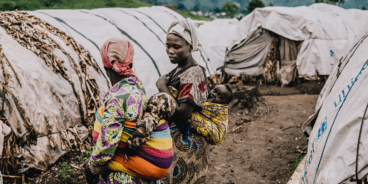
Atrocity Alert No. 147: Iraq, Democratic Republic of the Congo and International Justice
Atrocity Alert is a weekly publication by the Global Centre for the Responsibility to Protect highlighting situations where populations are at risk of, or are enduring, mass atrocity crimes.
Mass graves of Yazidi genocide victims finally exhumed in Kocho
Last Friday, 15 March, the Iraqi government, in cooperation with the UN Investigative Team for Accountability for Da’esh/ISIL (UNITAD), began exhuming a mass grave in the village of Kocho in northern Iraq. This marks the first major exhumation of the remains of Yazidis targeted and killed by the so-called Islamic State of Iraq and the Levant (ISIL). Following ISIL’s seizure of towns and villages around the Sinjar region in August 2014, ISIL carried out a genocidal campaign against the Yazidi. Nobel Peace Laureate Nadia Murad, a Yazidi human rights activist from Kocho who was enslaved by ISIL, was present at the exhumation and emphasized that all those responsible for committing or enabling ISIL’s atrocities must be held accountable.
During November 2018 the UN Assistance Mission for Iraq (UNAMI) and the Office of the UN High Commissioner for Human Rights (OHCHR) issued a joint report on atrocities committed by ISIL in Iraq. The report documented 202 known sites where between 6,000 and 12,000 of ISIL’s victims are buried, including many Yazidis. Most of these graves are yet to be exhumed and the remains of the victims returned to their families.
ISIL controlled large swathes of Iraq between July 2014 and December 2017, during which time UNAMI and OHCHR estimated that at least 30,000 civilians were killed and 22,150 wounded. During 2015 OHCHR found that abuses committed by ISIL – including killings, torture, rape and sexual slavery, and the conscription of child soldiers – may amount to war crimes, crimes against humanity and genocide. ISIL has since lost all the territory it once held in Iraq, and earlier today the Kurdish-led Syrian Democratic Forces reportedly took control of Baghouz, the last remaining ISIL-held village in Syria.
While the threat that ISIL once posed to the Yazidi and other ethnic and religious minorities in Syria and Iraq has decreased significantly, justice remains elusive. The government of Iraq should adopt enabling legislation to incorporate genocide, war crimes and crimes against humanity into domestic law. All UN member states should also continue to support UNITAD, which was established to preserve and protect evidence of ISIL’s atrocities. As Iraq approaches the fifth anniversary of ISIL’s genocidal campaign against the Yazidi, it is imperative that further steps be taken towards ensuring truth, justice, and reparations for all survivors of ISIL’s atrocities.
UN says Yumbi massacre in DRC was a pre-planned attack
On Tuesday, 12 March, the UN Joint Human Rights Office (UNJHRO) in the Democratic Republic of the Congo (DRC) released their final report on the 16-18 December clashes between the Banunu and Batende communities in Yumbi territory, concluding that possible crimes against humanity were perpetrated. UNJHRO found evidence of murder, torture, rape and other forms of sexual violence that took place in a series of planned attacks that were “characterized by extreme violence and speed.” According to testimony, victims were asked if they were ethnic Banunu before being killed by Batende villagers equipped with “firearms, machetes, bows and arrows and gasoline.” UNJHRO confirmed that at least 535 people were killed, including children, and that an estimated 19,000 people were displaced.
The report also noted that the DRC government had failed in its responsibility to protect the population of Yumbi. Citing “clear indications” that there were rising inter-communal tensions, the report noted that police deployed to the area failed to take effective preventive action. The new DRC government must address the ongoing risk of violent reprisals in Yumbi, including by arresting and punishing those responsible for inciting, ordering or committing the massacres. The government should also initiate an inter-communal dialogue between the Banunu and Batende and mediate ongoing conflict.
Meanwhile, in North Kivu armed groups continue to undermine efforts to contain a major outbreak of deadly Ebola. On 14 March a medical treatment facility in the Biena health zone was attacked, marking the fourth such attack on an Ebola treatment facility in the last two weeks. National and provincial elections, which were postponed in the area due to Ebola, are scheduled to take place at the end of March despite the deteriorating security situation.
As the UN Security Council prepares to renew the mandate of the UN Stabilization Mission in the DRC (MONUSCO) next week, it must consider the various political, humanitarian and security challenges currently facing vulnerable populations across the country. The UN mission must be equipped with the necessary resources to uphold its civilian protection mandate, confront armed groups, and assist the new DRC government in resolving inter-communal conflicts. Council members should ensure that there is no further depletion of MONUSCO’s resources or personnel.
The Karadžić genocide verdict and international justice
Today, 20 March, the UN International Residual Mechanism for Criminal Tribunals (MICT) confirmed the conviction of Radovan Karadžić – former President of Bosnia’s Serb-dominated Republika Srpska – for genocide, crimes against humanity and war crimes. Karadžić, who was first indicted by the International Criminal Tribunal for the former Yugoslavia (ICTY) in 1995, was on the run for years until he was finally arrested and handed over to the Tribunal in 2009. Following an appeal, today the judges upheld the ICTY’s 2016 judgement and found Karadžić guilty of genocide at Srebrenica in 1995, persecuting Bosniaks and Croats throughout Bosnia-Herzegovina and terrorizing the civilian population during the brutal siege of Sarajevo, as well as of taking UN peacekeepers hostage. Karadžić’s sentence was also increased from 40 years to life imprisonment.
The path to justice for Karadžić’s victims has been long and torturous. But while Karadžić was one of the ICTY’s most notorious prisoners, he was not alone. From 1993 until 2017 the ICTY concluded proceedings against 154 persons and sentenced more than 80 perpetrators for genocide, crimes against humanity and war crimes.
Accountability for mass atrocity crimes is one of the most effective ways of preventing their recurrence. Nevertheless, during recent years some states – facing unwelcome scrutiny for alleged human rights violations and abuses – have tried to weaken the international justice system. Last Sunday, 17 March, the Philippines officially withdrew from the International Criminal Court (ICC). During February 2018 the ICC launched a preliminary investigation into a campaign of extrajudicial killings allegedly committed as part of the government’s so-called “war on drugs.” President Rodrigo Duterte announced the Philippines’ intention to withdraw from the Court shortly afterwards. Last week the United States also announced its intention to deny visas to ICC personnel in an attempt to deter the Court from investigating its citizens as part of an ongoing examination of torture and other crimes perpetrated in Afghanistan.
Despite these attempts to obstruct justice, progress continues. The Global Centre for the Responsibility to Protect applauds Malaysia’s recent decision to ratify the Rome Statute and become the ICC’s 123rd member. We also commend Germany, France and other states that are using the principle of universal jurisdiction to hold perpetrators of war crimes and crimes against humanity in Syria accountable under international law.
Related Publications


